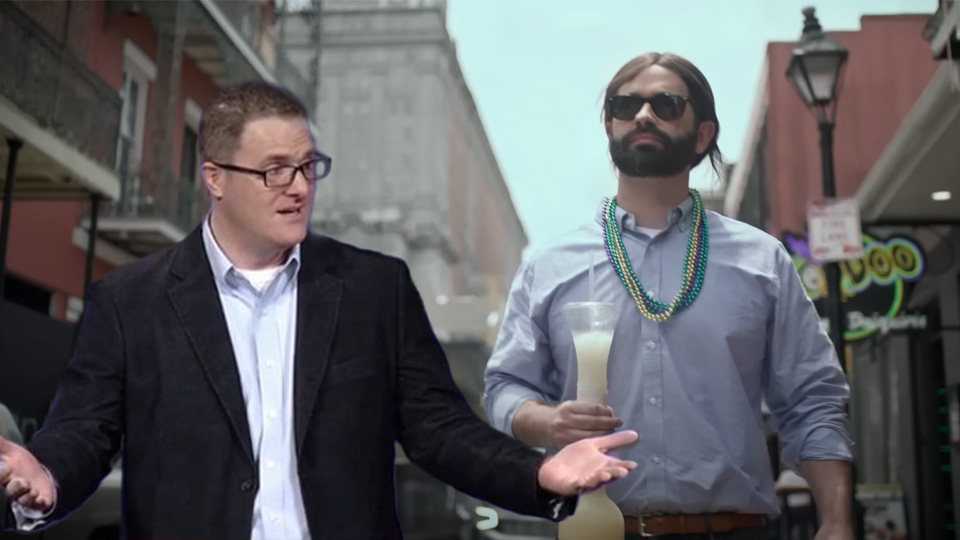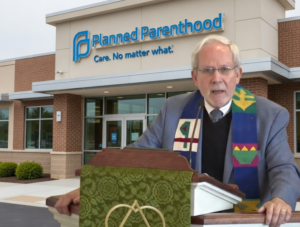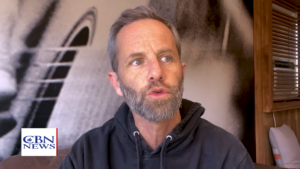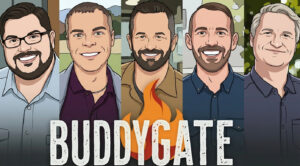Controlled Opposition is defined as a protest movement covertly led by the entity being protested. The benefits for The Machine™ (the entity being protested) are multi-faceted. First, by controlling the opposition, they can limit how far the protest goes, ensuring it doesn’t go far enough to make a difference. Secondly, by controlling opposition, they can give protestors the feeling that they’re making a difference when, in fact, they are making no difference at all. And third, those in positions of controlled opposition can sabotage a movement from the top down in myriad ways.
For example, it’s become clear that the FBI engaged in controlled opposition on January 6, inciting an unauthorized tour of the U.S. capitol that would backfire politically on those desiring election integrity. Or, in the case of American evangelicalism, Albert Mohler became the assumed face of conservative values while hiring and promoting the most rabid Cultural Marxists in the Christian church today. This tactic has become invaluable for institutional corruption.
Evangelicalism, in particular, is filled with Controlled Opposition actors who project themselves as the epitome of conservatism yet are routinely found to be undermining the conservative movement at every turn. Here is a case in point:
Such is the plight of the man in the arena that he must endure slings and arrows from those whose interests he advances but who themselves lack the courage and faith to do the same.
— Jeremy Boreing (@JeremyDBoreing) September 17, 2024
I say courage and faith because the man in the arena must be bold enough to stick his neck out,… https://t.co/mjEKQ3mTDZ
Denny Burk, who Jeremy Boreing of The Daily Wire opines about in the above tweet, is one of those within Mohler’s circle of influence, which largely and routinely does more to undermine the conservative movement than support it. A professor at Boyce College, Burk is a longtime commentator on political and cultural issues and says some good things whenever his weathercock of a conscience has determined it coincides with the popular thing to say.
For example, Burk was one of those in the 2016 Latte Mafia who first complained that promoting Donald Trump was tantamount to “losing the gospel in politics,” ostensibly because Trump wasn’t Christian enough. That’s back when Burk was a full-time advocate for Marco Rubio, who he unashamedly pronounced as saved (which is weird, because Rubio is a Roman Catholic and Baptists are kinda committed to Sola Fide the last we checked).
Please note, Burk could have endorsed one of two Southern Baptists running for president that year (Mike Huckabee or Rand Paul), but he curiously supported the least conservative candidate of all the options in that primary. This is, of course, how Controlled Opposition works.
And Boreing is quite right. Whenever somebody lands a good blow on the devil’s minions, Controlled Opposition predictably throws a flag on the field, crying foul. Usually, as is the case with Burke, it’s done while simultaneously signaling their own virtue, backed up with a Veggie Tales rendering of Christian ethics.
To the point, in his new documentary film, Am I a Racist?, Matt Walsh (also of The Daily Wire) interviews looney-eyed, liberal, caterwauling race-baiters and gets them to be candid about what they really believe. We would link reviews of Am I a Racist? but there aren’t any because it’s been blacklisted by critics despite premiering in 1500 theaters and enjoying fourth place at the box office.
It follows his film, What is a Woman?, in that it gets liberals crazies to say crazy liberal things – in their own words – and often gets them to say the quiet part out loud. How does he do that? He pretends to be a sympathetic to their views and doesn’t introduce himself as “Matt Walsh of The Daily Wire and I am here to expose your stupidity.”
So what’s the problem? Denny Burk is asking whether his tactics could be…get this…sinful.
First, if we might respond to the question irrespective of an argument related to Christian ethics, it would be as follows:
It could not be any more painfully obvious that what Burk takes exception with is not Walsh’s use of discretion in his tactics, but in Walsh’s success in pointing out what Burk for years has refused to acknowledge among his own colleagues in the orbit of Albert Mohler: Critical Race Theory is demonic and stupid.
It is exactly this type of whining, snot-nosed, mouth-breathing obnoxiousness that makes the typical churchman – or for that matter, American – despise the theological caste.
Largely, they are effeminate men, with potluck-bloated guts and soft hands, who literally do no good to stop the forces destroying our civilization. What they offer, the extent of which is moral unclarity repackaged as self-righteousness, is no less toxic to our country than what they claim to oppose in latte-breathed whispers.
But, we suppose such a response should indeed include theological reasonings, and we aim to do it better than the Bible professor at Boyce College.
Burk’s manifesto is published at World, and includes no shortage of hand-wringing lectures warning Christians not to endorse tactics that employ “dishonesty.”
He cites Robin DiAngelo, author of White Fragility: Why It’s So Hard for White People to Talk About Racism, in her complaint that Walsh was deceitful in concealing his full identity. Walsh, on the other hand, says that he merely didn’t give DiAngelo all the facts that she was in no way entitled to (for example, that he was adversarial). Burk cites the accusation of someone no Christian should presume is truthful, using it to frame his morality lecture. That’s an interesting choice for someone who claims to be on our side.
Burk writes, “…the release of the film has opened up a conversation about the ethics of deception and lying when doing so for an ostensibly good cause.”
This is the type of ethical quandary only asked by the clergy class that’s prone to irrelevant, impertinent babblings. It interests no one except the critics of the cause such men claim to support. It’s the type and magnitude of seminarians spouting pacifism while the Red Coats are breaching the door way. It is counter-productive and unnecessary. Is there a plague of rogue Christian documentarians causing a crisis in America’s conscience? Or is it possible that Burk only wants there to be.
Burk cites Walsh’s explanation that they were not lied to, but certain truths were omitted (like “you’re about to look stupid”), they were paid handsomely for their time, and they signed a waiver permitting the footage to be used. He further opines:
“But this surely isn’t an adequate answer to a serious question about the ethics of lying. Again, I’m not saying that Walsh lied in his interactions with DiAngelo. I wasn’t there, and he has not responded to my request for comment. Perhaps he didn’t lie. Still, doing ‘what it takes to win the culture war’ suggests that the end justifies the means no matter what they are. Surely, that is not what Walsh believes.”
Listing a handful of Scriptures about honesty, Burk adds:
“This means that our obligation to tell the truth cannot be set aside merely to ‘own the libs’ or even for the noble purpose of taking down the DEI regime. As Romans 3:8 tells us, those who employ evil means to achieve a noble end are worthy of condemnation. This is not a path that Christians can take, even as they otherwise cheer for the dismantling of destructive woke ideologies. And I say three cheers for those fighting the good fight, but let’s honor the truth when we do.”
We want to apologize to Matt Walsh – a Roman Catholic – on behalf of this man who claims to be a Protestant evangelical, and assure him that we are not all so foolish. We would have preferred Burk demonstrate for Walsh an exercise in classical Christian ethics, to have diligently done the hard work of exegesis, and considered the full counsel of God’s word on the subject of honesty and deception, because we don’t have a Pope to consult on Scriptural interpretation. We’re expected to be able to do that hard work ourselves, and Burk is a poor example of what we are capable.
Of course, it’s accurate to say that habitual truthfulness is a Christian virtue, as it’s enshrined in the 9th Commandment (Matt, it’s your 8th Commandment, but don’t get us started on that). We should not bear false witness, just as we should not murder. Of course, that’s Ethics 101, fit for publication on either stone tablets or put into a Veggie Tales song. Serious theologians put in the work to explain how that law of morality is applied into time and space, given the circumstances of each and every situation.
For example, the Egyptian midwives deceived Pharaoh when they saved the Hebrew babies and told him, by all accounts, what amounted to less than the truth (Exodus 1:1-21). God then blessed them for it (Exodus 1:20), a sure a commendation for deception as is possible. Or consider Rahab the harlot, who deceived to save the Jewish spies (Joshua 2:1-7). Her deception was later exonerated as an act of faithful obedience in Hebrews 11:31. For it, God immortalized her in the Hall of Faith under the inspiration of the Holy Spirit.
One can only imagine how many articles Denny Burk could have scrolled out on papyrus, had he been their contemporary, lamenting the sin of their dishonesty. This is exactly why serious times call for serious men, and professional theologians with an amateur grasp of theology are seldom serious men. The church needs them like we need prosperity preachers, and they contribute to Christ’s cause about as much.
The Ten Commandments, in case Burk has not noticed, speak of our obligations and to those whom our obligations are due. Overlooking this fact is the cause of no shortage of moral perplexities.
For example, the first four commandments deal with our obligations to God. To God, we give all of our worship. For God, we reject all idols. In regard to God, we honor his name. Because of God, we honor his Sabbath. The latter has exceptions given in Scripture, the first three commandments do not.
The next six commandments deal with our obligations to other men. For our parents, we honor and obey them. Regarding innocent men, we do not kill them. In respect to our spouse, we are faithful. Regarding property owners, we don’t take their stuff. Toward our neighbors, we don’t bear false witness about them and we don’t covet what is theirs. Several of these have no exceptions (prohibitions against adultery and not taking or coveting other people’s property), and several do.
Notice the italics in the command. We don’t bear false witness about our neighbors.
You shall not bear false witness against your neighbor (Exodus 20:16).
The first oft-overlooked exegetical nugget in this verse is that what is presumed by the language used, or what is in the mind of the Author, is testimony in a court of law. This is the etymological context of the Hebrew עֵ֥ד, or “witness.” It is one who is called up and sworn to testify as a matter of explicit truth. This doesn’t mean the passage can’t apply outside the courtroom, but it does keep with the overall motif of obligation to someone in particular, as found in all of the other commandments. We have an obligation not to lie about our neighbor (injuring his reputation) and not to lie to whatever earthly authority has laid upon us the obligation of truthful testimony.
Outside of this contextual understanding of the commandment, one must impugn the Egyptian midwives and Jesus’ great-grandmother with sin (not to mention Matt Walsh).
However, Rahab and the midwives aren’t the only people commended in the Bible – or in some cases, commanded – to exercise deceit to the glory of God. Consider Ehud telling wicked King Eglon he had a gift, which turned out to be a knife to the gut(Judges 3:14-29). Or consider Jael not telling Sisera she wasn’t a fan, and was about to jam a tent peg into his head (Judges 4:21).
In short, the Scriptures endorse misleading and, in some cases, deceiving to those who are not entitled to the truth. This is similar to the Scriptures endorsing killing when one is not entitled to life (for example, the home invader in Exodus 22:1 or the kidnapper in Exodus 21:16-18).
Are Nazis at the door, wondering if you have Jews hiding in your basement? They are not entitled to the truth. Gynecologists, for whatever reason, are now asking expecting parents if they have loaded weapons at home. That’s none of their business, and they are not entitled to the truth. If a stranger approaches your wife and asks if her husband is home while you’re away, she has no sin guilt by responding, “Yes, and he’s large and cleaning his guns.” A business has not sinned by posting the sign, “no cash kept on premises,” when, in fact, it does indeed have cash on the premises. Thieves are not entitled to the truth about where the cash is kept.
In regards to Walsh, he is doing the Lord’s work. We are to be “wise as serpents” (Matthew 10:16), which does not require the indiscriminate displaying of cards close to our chest. We are to “expose the fruitless deeds of darkness” (Ephesians 5:11).
This may come as a shock to ivory tower theologians, but darkness has to be “exposed” involuntarily. Darkness hides (John 1:5), or better yet, evil hides in darkness. And yet Gideon, using darkness to his advantage, misled the forces of Midian as to the numbers in his army, snuck up on them, and slayed them in their sleep (Judges 7:20). He projected, quite dishonestly, far more soldiers than what he actually had, and in fact caused them to panic and slay themselves.
Sun Tzu is cited universally on the art of war: All warfare is based on deception. Hence, when we are able to attack, we must seem unable; when using our forces, we must appear inactive; when we are near, we must make the enemy believe we are far away; when far away, we must make him believe we are near.”
And might we remind you that the God who said not to kill says that there is a time for war (Ecclesiastes 3:7-8). We’re unaware of a Christian theologian anywhere who would denounce deception in warfare, although it wouldn’t surprise us. It’s up to Burk to argue that we are not at war with those who seek the destruction of our culture and the demise of our civilization.
Now, let’s presume that there are theologians out there who claim to be on God’s side in the culture wars and who go to great lengths to project themselves as the most ardent warriors. However, the contribution these theologians make is to shame those making a difference, using shoddy exegesis and poor theology, all for the sin of not ceding to the enemy the element of surprise or not fighting “fair enough.” It would be wise to ask whether or not their opposition was controlled by the other team.
Matt Walsh’s “dishonesty” is not bearing false witness about his enemies, as the Scripture forbids, but is making his enemies be honest about themselves. And that’s no sin at all.
Unfortunately, in the contest of Christian ethics between a Baptist and a Romanist, only one suffers from the malady of moral unclarity in dangerous times.























5 responses to “Op-ED: Is Matt Walsh Sinning in ‘Am I a Racist?’”
It is quite curious how the Phil Vischers, David Frenches. Russell Moores, and Julie Royses of the world have NOTHING bad to say about the Left and their pernicious evil. No, instead they attack and smear CONSERVATIVE CHRISTIANS. Look at Julie Roy’s’ website- constantly attacking conservative candidates, but she wouldn’t dare say a single thing about democrats! Maybe there is agenda going on here?
There’s a line somewhere, no doubt. Otherwise it would get ridiculous to the point that a ballplayer would be sinning by faking a pass. A woman would be sinning by putting on makeup. You could go to great extremes. At the same time, an anything goes, ends-justifies-the-means, there’s no limit approach is also incorrect.
There’s also a bit of irony in that those objecting to his investigative tactics are essentially conveying a message that those he interviewed should be allowed to conceal the truth and to continue their own destructive and wicked deceptions, continuing to deceive many. Critical theory itself being insidiously deceptive.
I’d say the time for Mr. Burk to bring up this sort of discussion is not right in the middle of a heated election. It would’ve been wiser to wait until after the election, at a better time, when everybody’s settled down. It’s a debate worth having. And as Alex noted, dishonesty and deceit can come in the form of failure to apply equal weights and measures, hypocrisy, double-standards, and so on, in which case calling out dishonesty can itself be very dishonest. But maybe now is not the best time for that debate, in my opinion.
People have been praising Al Mohler for quite a while now while ignoring how he has torn SBTS apart. I’m a proud graduate of its’ (once) great Church Music school. He destroyed that great school by focusing on praise and worship bands along with the CCM movement of the 1990’s -2000’s. The school no longer exists except folded under the another division. We were taught to give back to SBTS as others did to pay for our education . When Mohler became President, I asked the school to not call me anymore. I knew what would happen by people who went to Seminary with him. They weren’t wrong.
Saiko Woods began ridding on Roys’ coat tails when she tried to access MacArthur of being a millionaire hypocrite. The research and facts made that story a laughingstock. Woods was booted off YouTube, but still griffs for cash on his Facebook page.
You missed the clearest one. In many of the Bible examples you give, it could be argued that God rewarded people for their faith – and/or good intentions – instead of for their lying. This one is clear: God tells Samuel to both mislead and withhold information to protect his life from Saul. However, God does not tell Samuel to actually lie.
1 Samuel 16:1-5 Now the LORD said to Samuel, “How long will you mourn for Saul, seeing I have rejected him from reigning over Israel? Fill your horn with oil, and go; I am sending you to Jesse the Bethlehemite. For I have provided Myself a king among his sons.” 2 And Samuel said, “How can I go? If Saul hears it, he will kill me.” And the LORD said, “Take a heifer with you, and say, ‘I have come to sacrifice to the LORD.’ 3 “Then invite Jesse to the sacrifice, and I will show you what you shall do; you shall anoint for Me the one I name to you.” 4 So Samuel did what the LORD said, and went to Bethlehem. And the elders of the town trembled at his coming, and said, “Do you come peaceably?” 5 And he said, “Peaceably; I have come to sacrifice to the LORD. Sanctify yourselves, and come with me to the sacrifice.” Then he consecrated Jesse and his sons, and invited them to the sacrifice.